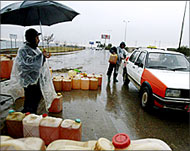Iraq to decrease subsidies
The interim Iraqi government plans to phase out subsidies on basic products for its people.

Commodities such as oil and electricity, which comprise 50% of public spending, equal to $15 billion, will be included, the interim planning minister has said.
Unveiling a three-year economic plan, compiled in cooperation with the World Bank and the International Monetary Fund, Mahdi al-Hafidh pledged “a progressive programme to suppress subsidies [which] constitute a significant burden on public finances”.
Most Iraqis relied on subsidised fuel, electricity and food rations under a United Nations-sponsored oil-for-food programme during the rule of Saddam Hussein.
After Saddam’s overthrow, the interim government adopted the system which still provides a lifeline for a large portion of the population, many of whom are unemployed or earn only a meagre wage.
Seeking to soften the blow, the minister promised that the government would cancel subsidies slowly to ensure a minimal impact.
“They will progressively be reduced over the coming years,” al-Hafidh said.
Oil subsidies
Direct and indirect oil subsidies cost Iraq $8 billion – $2.4 billion of which is spent on imports to satisfy the local market, according to ministry figures.
 |
|
Fuel is sold at less than $0.025 |
The price of a barrel of oil sold to local refineries is 300 dinars ($0.2) and some 550,000 barrels are sent to the refineries daily to satisfy domestic need.
At petrol stations, fuel is sold at between $0.01 and $0.025 per litre – underscoring the huge expense shouldered by the government.
Oil in the financial year 2005 is expected to comprise 93% of the country’s revenue, at some $18.1 billion.
2005 budget
Iraq is predicted to generate revenues of $19.4 billion which, coupled with external aid, will bring total revenues to $23.7 billion.
|
‘Iraqi companies are starting to participate, to take sub-contracts from foreign companies’ Mahdi al-Hafidh, |
But the budget is seen at $30.4 billion, meaning a deficit of some $6.7 billion, including foreign help, and $11 million without.
The 2005 budget is based on a price of oil of $26 per barrel – a hugely conservative estimate, considering the price of oil ended the week at a record $55.50 a barrel.
“We have put very conservative figures on oil prices and if it
continues to rise we might be able to cover the deficit,” said
al-Hafidh.
Iraqi participation
Turning to the impact of insecurity on reconstruction efforts in Iraq, al-Hafidh said his request that more local companies are involved in the contracts – which had typically been handed out to US and British firms – was well received by the international community at a donor conference last week in Tokyo.
“Iraqi companies are starting to participate, to take sub-contracts from foreign companies,” he added.
After the two-day gathering in the Japanese capital that ended on Thursday, a joint statement by the 57 countries and institutions vowed faster aid to Iraq. Much of the pledged assistance has been held up because of widespread violence.